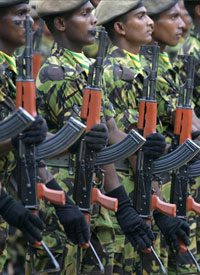
The long-running war in Sri Lanka, the impoverished Indian Ocean nation suspended like a tropical teardrop below India’s southern tip, appears to be near an end. The secessionist war between the Tamil Tigers of Eelam (LTTE) and the majority Sinhalese government has attracted sporadic international attention over the years, but never the sort of sustained intervention that has taken place in the Balkans or in the Middle East.
Yet the Tamil Tigers, who rose to notoriety in the mid-eighties, have in many ways redefined the potential of terrorist movements the world over. It was the Tigers who invented explosive vests and pioneered the use of suicide bombings as a terrorist tactic, with special cadres of elite fighters (the “Black Tigers”) trained for suicide missions. The LTTE has also not scrupled to attack high-profile targets with military precision. They successfully carried out the assassination of Indian Premier Rajiv Gandhi in 1991, using a bomb concealed in a basket of fruit. In July 2001, only weeks before this writer left Sri Lanka, the Tigers attacked the national airport, destroying a number of military and civilian aircraft on the ground and storming the passenger terminal.
The Tigers, founded in 1976, are led by the fanatical and secretive Vellupillai Pirabagaran (sometimes spelled Pribhakaran), who has long sought to set up an independent Tamil homeland (Eelam) occupying the northern and eastern part of the island of Sri Lanka. Now Pirabagaran and his remaining forces, after more than two decades of running a de facto independent state complete with a navy, police force, and tax collection, are holed up in a tiny strip of coastal land in northwestern Sri Lanka, apparently holding tens of thousands of civilians hostage to forestall an all-out government assault on this last stronghold.
Anyone with any knowledge of Sri Lanka knows that, despite the barbarity of the Tamil Tigers and their tactics, there is considerable justification for many of their complaints. The Tamil-speaking Hindu minority in Sri Lanka have always been successful out of proportion to their numbers among the majority Sinhalese, who are Theravada Buddhists and who, since independence from Great Britain, have controlled the government. The Buddhist Sinhalese government has, as charged, enacted many discriminatory laws and policies designed to prevent the Tamils from enjoying too much economic or political success. These have included a law that denied Sri Lankan citizenship to certain groups of Tamils. Under such conditions, a portion of the Tamil population became radicalized, and in the early ’80s, the tension escalated into a full-blown civil war.
The flashpoint was July 1983 (“Black July”), in which an LTTE cadre ambushed a military patrol in the north, killing a dozen soldiers. Sinhalese mobs across the country massacred thousands of Tamils in response. In the capital Colombo, an entire Tamil neighborhood was put to the torch. This episode hardened attitudes on both sides, and the war has raged almost without respite ever since, claiming tens of thousands of lives and turning one of the world’s most beautiful tropical island paradises into a killing field.
Besides the awful death toll, the war has had another side effect: the transformation of Sri Lanka into an oppressive police state. This author, who spent nine months in Sri Lanka a few years ago, remembers all too well the frequent military check points at which passengers were required to shuffle dejectedly from the bus and wait in line for their identification cards and personal effects to be inspected, all under the benevolent watch of rifle and machine gun barrels. On one occasion, a young Tamil woman sitting beside me was arrested by soldiers and hauled off, presumably to interrogation, torture, and an anonymous death in some rural ditch.
The Sri Lankan conflict has thus involved evil on evil, with growing tit-for-tat radicalization producing abundant atrocities on both sides. Sri Lanka’s long-suffering citizenry, meanwhile, have paid a price in diminished liberties and a ravaged standard of living. As the Sri Lankan war shows, violence against oppression may sometimes be justified, but carries with it hazards of its own, the foremost being that the oppressed may become the oppressor.
Few outside of a clamorous minority within the international Tamil community are likely to mourn the passing of the LTTE, but the future of Sri Lanka in the wake of a ruinous war is very much in doubt.
— Photo: AP Images


